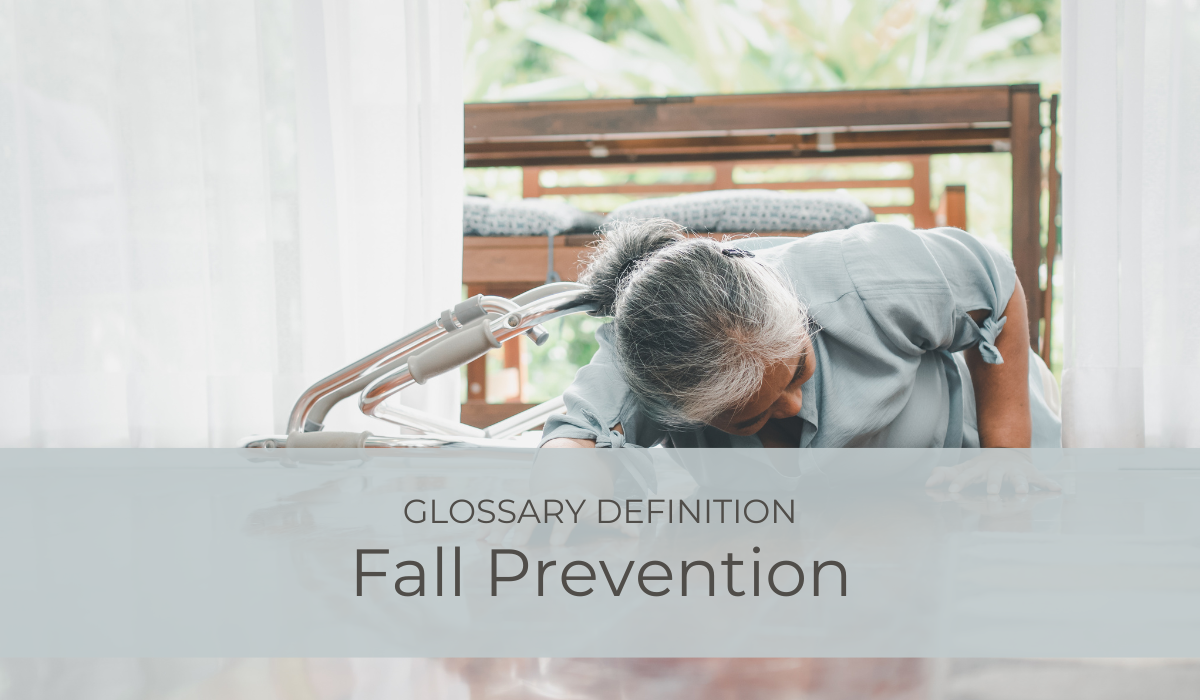Fall Prevention | Glossary Definition

As we look out for our elderly family members, it's important to be aware of the risk of accidents. For seniors, the risk of falling is a significant concern, but with the right knowledge and precautions, we can help them stay safe year-round. In this article, we will explore some essential tips for preventing accidents among seniors.
Understanding the Risk
Accidents can happen to anyone, but as we age, the risk of accidents increases. Seniors often face challenges like weaker muscles, reduced balance, and impaired vision, making them more susceptible to accidents. However, the good news is that many accidents are preventable with some simple changes to daily routines and living spaces.
Stay Active
One of the best ways to prevent accidents is by staying physically active. Regular exercise helps maintain muscle strength and flexibility, improving balance and coordination. Activities like walking, yoga, and tai chi are excellent options for seniors. Always consult a healthcare professional before starting a new exercise routine to ensure it's safe for your loved one.
Medication Management
Seniors often take multiple medications, which can sometimes interact with each other or cause side effects like dizziness. It's crucial to keep an updated list of all medications and discuss them with a healthcare provider regularly. They can help adjust doses or switch medications if necessary to reduce the risk of accidents.
Regular Eye Exams
Poor vision is a common factor in accidents among seniors. Ensure your loved one has regular eye exams and wears glasses or contact lenses with the correct prescription. Adequate lighting in the home is also essential to prevent trips and stumbles.
Home Safety
Making some simple modifications to the home can significantly reduce the risk of accidents:
- Remove tripping hazards: Keep pathways clear of clutter, loose rugs, and electrical cords.
- Install handrails and grab bars: These can be added to bathrooms, stairways, and other areas where seniors may need support.
- Non-slip surfaces: Place non-slip mats in the bathroom and consider adding adhesive strips to outdoor steps and indoor floors.
- Adequate lighting: Ensure that all areas of the home are well-lit, especially at night. Nightlights can be particularly helpful in bedrooms and hallways.
- Use assistive devices: If needed, consider mobility aids like canes or walkers to provide additional stability.
Footwear Matters
The right footwear is crucial for accident prevention. Encourage your loved one to wear supportive, non-skid shoes with proper arch support. Slippers and socks with gripped soles can also help prevent slips indoors.
Regular Health Check-Ups
Regular check-ups with healthcare providers can help identify and address any medical issues that could increase the risk of accidents. Conditions like osteoporosis, arthritis, or heart problems may require specific management to minimize the risk of accidents.
Stay Hydrated and Eat Well
A balanced diet with adequate hydration is essential for overall health and can contribute to maintaining strong bones and muscles. Ensure your loved one drinks enough water and consumes a variety of nutrient-rich foods.
Conclusion
Accident prevention is a vital aspect of senior health and safety, and it's something we should be mindful of year-round. By staying active, managing medications, keeping up with eye exams, and making necessary home modifications, we can reduce the risk of accidents for our elderly loved ones. Remember, a little effort and attention can go a long way in ensuring they have a safe and comfortable living environment.
We'd love to hear your thoughts and experiences on keeping seniors safe and preventing accidents. Have you implemented any of these tips for your loved ones, or do you have additional suggestions to share? Please leave your comments below, as your insights could be invaluable to others looking to enhance senior safety. Join the conversation, and let's work together to create a safer environment for our elderly family members!
Ready to deepen your understanding of the elderly family caregiver industry? Don't miss out on our comprehensive Caregiver Bliss Glossary, a treasure trove of definitions and insights. Visit our glossary page now to explore a diverse range of terms and concepts that will enrich your knowledge and empower your caregiver journey.
 Are you a dedicated family caregiver looking for valuable resources, support, and advice to enhance your caregiving journey?
Are you a dedicated family caregiver looking for valuable resources, support, and advice to enhance your caregiving journey?
Look no further! Our Caregiver Bliss Weekly Email Newsletter is designed to provide you with the latest insights, tips, and updates tailored specifically for family caregivers like you.
Sign up now and gain access to a wealth of information and support that can help you navigate the challenges and joys of caregiving.
